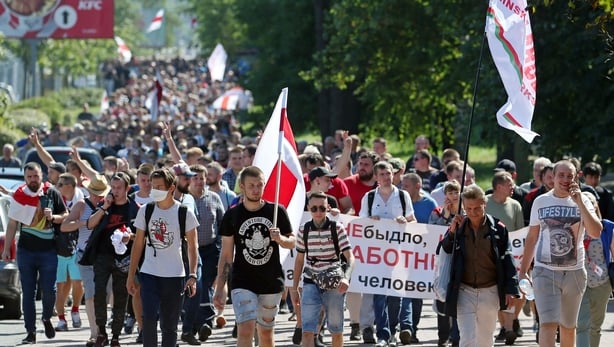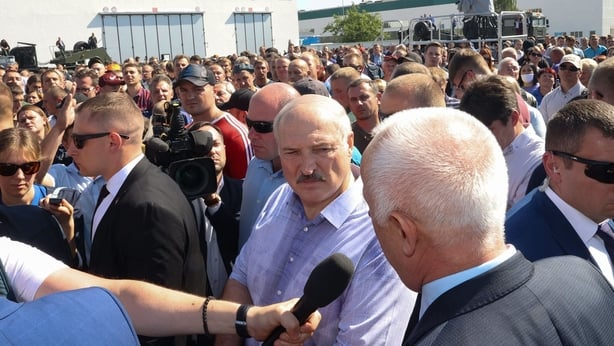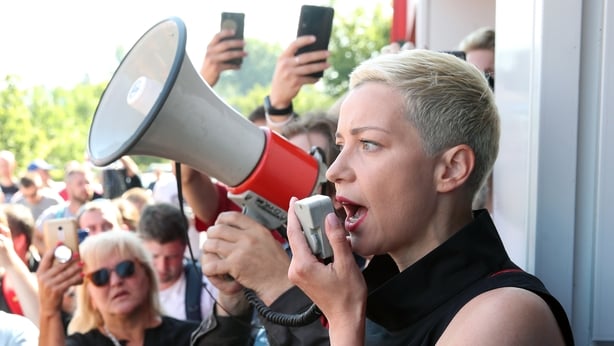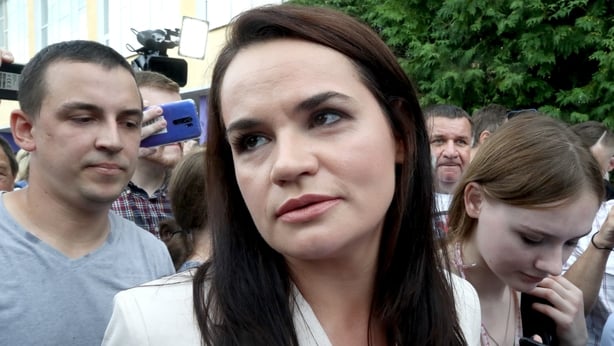The US President, Donald Trump, has said the United States will be closely watching the "terrible" situation in Belarus, where a political crisis erupted after a presidential election on 9 August that protesters say was rigged.
"It's terrible. That's a terrible situation, Belarus. We'll be following it very closely," Mr Trump said.
It comes after US Secretary of State Mike Pompeo said on Saturday that the US is discussing the situation in Belarus with the European Union after the disputed election and subsequent crackdown on protesters.
Speaking in Warsaw, his last stop on a tour of central Europe, Mr Pompeo said the US was tracking the situation in Belarus.
Security forces have clashed with protesters in Minsk and other cities after President Alexander Lukashenko claimed a landslide re-election victory in a vote that his opponents say was rigged.
However today Mr Lukashenko said he would be willing to hand over power after a referendum in an apparent bid to pacify the mass protests and strikes that pose the biggest challenge to his 26 years in office.
He made the offer, which he insisted would not be delivered on while he was under pressure from protesters, after exiled opposition politician Sviatlana Tsikhanouskaya said she was willing to lead the country.
In a sign of his growing vulnerability, Mr Lukashenko faced heckling and chants of "step down" during a speech to workers at one of the large state-run factories that are the pride of his Soviet-style economic model and core support base.
He faces the threat of EU sanctions after a bloody crackdown on protests following his re-election victory last week.
He denies losing, citing official results that gave him just over 80% of the vote.

The EU is also preparing to send a message to Russia not to meddle, after Moscow told Mr Lukashenko it was ready to provide military help in the event of an external threat.
Russia is watching closely as Belarus hosts pipelines that carry Russian energy exports to the West and is viewed by Moscow as a buffer zone against NATO.
Mr Lukashenko and Russian President Vladimir Putin spoke twice this weekend.
A burly former Soviet collective farm manager, Lukashenko used blunt language while speaking to workers today.
"We've held elections," he said. "Until you've killed me there won't be any new elections."

However he offered to change the constitution, an apparent concession that seems unlikely to satisfy protesters who say it is something he has spoken about before.
"We'll put the changes to a referendum, and I'll hand over my constitutional powers. But not under pressure or because of the street," Mr Lukashenko said, in remarks quoted by the official Belta news agency.
"Yes, I'm not a saint. You know my harsh side. I'm not eternal. But if you drag down the first president you'll drag down neighbouring countries and all the rest."
He also said people could hold parliamentary and presidential elections after the referendum if that was what they wanted.

Here, the Minister for Foreign Affairs, Simon Coveney said today that he was "deeply concerned by the ongoing developments in Belarus" and said that he condemns the "human rights abuses which we have seen take place since the flawed Presidential election".
Minister Coveney said the result of the election was "not legitimate", adding that "Ireland does not accept the election result as a true reflection of the democratic will of the Belarusian people".
He said he "commend the many thousands of people who have made their voices heard, including through the mass demonstrations we have seen over the weekend".
Minister Coveney said: "We will continue to press the Belarusian authorities to release all civilians who were unjustly detained and we fully support the initiation of a process of targeted sanctions."
'Ready' to lead - Tsikhanouskaya
Speaking in a video address from Lithuania, Sviatlana Tsikhanouskaya urged security and law enforcement officers to switch sides.
"I am ready to take responsibility and act as a national leader during this period," she said.
Her video was released as hundreds of employees from the state broadcaster BT went on strike, as several presenters and staff publicly resigned in solidarity with the protesters.
The strike came as protests spread to those normally seen as loyal to the 65-year-old president.
Some police, a sitting ambassador, prominent athletes and a former prime minister have also voiced solidarity with the protesters.
The state broadcaster showed re-runs this morning before issuing a fresh news bulletin.
Videos on social media suggested BT had at one point aired footage of an empty studio with white sofas, and music playing.
Reuters could not independently confirm that and the broadcaster could not immediately be reached for comment.

Factory workers waving flags and posters joined protesters to rally outside the building, which was being guarded by security forces.
"We want to work honestly, we do not want to be forced to lie," TV host Oleg Titkov told Reuters.
Thousands of protesters had earlier marched to a factory where Mr Lukashenko flew by helicopter to speak to striking workers. He got a rough reception.
"Thanks, I've said everything. You can (continue to) shout 'step down,'" he said, struggling to be heard.
He then walked away as the crowd chanted "Step down".
Media outlet Tut.By showed footage of Mr Lukashenko confronting one worker, saying "I will not beat you up" before adding "if somebody provokes something here, we will sort it out in a hard way. So, man up."
Strike action hit Belaruskali, one of the world's largest potash producers, partly shutting production, Russia's TASS news agency cited a local trade union as saying.
The state-owned firm, a key source of dollar revenue for Belarus, said its plant was still working.
EU leaders will send a message of solidarity to Belarusian protesters during an emergency video conference on Wednesday, while Britain condemned the violence used "to suppress the peaceful protests that followed this fraudulent presidential election".

